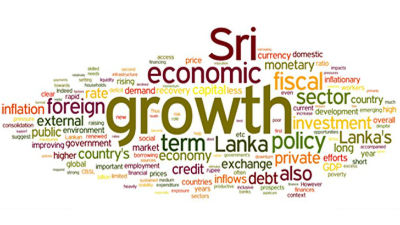 Last week, the cabinet unanimously approved the setting up of a National Economic Council (NEC) after a brief discussion. The smooth sailing of this cabinet paper underlines the mutual understanding and trust between two pallbearers of the consensual government, President Maithripala Sirisena and Prime Minister Ranil Wickremesinghe.
Last week, the cabinet unanimously approved the setting up of a National Economic Council (NEC) after a brief discussion. The smooth sailing of this cabinet paper underlines the mutual understanding and trust between two pallbearers of the consensual government, President Maithripala Sirisena and Prime Minister Ranil Wickremesinghe.After the two leaders met privately and sorted out issues, there was nothing for the cabinet members representing the Sri Lanka Freedom Party (SLFP) and United National Party (UNP) to object to.
As aptly described by Minister Dr. Sarath Amunugama, the Unity Government has reached the halfway point of its five-year term and the proposed NEC will help implement and speed up the economic activities already initiated by the Government. “Political parties have their own philosophies, their own approaches, and it is necessary that we engage in discussions and arrive at a win-win situation,” he said.
NEC will be headed by the President, with the participation of the Prime Minister, Finance Minister, Secretary to the President, Secretary to the Prime Minister, Cabinet Secretary, Governor of the Central Bank of Sri Lanka and Secretaries to the Treasury and the Ministry of Finance and the Ministry of National Policy and Economic Affairs. The President will appoint a Secretary General to NEC and he/she will oversee functions and carry out decisions made by the Council.
The fiscal and implementation aspects of economic policies will come under NEC. Generally, the Finance Ministry deals with the fiscal aspect, while the Planning Ministry oversees implementation.
Hitherto, the economic policy decisions were formulated by the Cabinet Committee on Economic Management (CCEM), established on September 23, 2015 through a Cabinet decision.
The CCEM is headed by the Prime Minister. After the establishment of NEC, the CCEM is expected to function under NEC and will be required to follow policy guidelines and other matters laid down by the superior body. Now, with the establishment of NEC, its Secretary-General is likely to represent NEC in the CCEM -if it continues to function- and in other relevant bodies, in respect of economic and financial matters.
The CCEM has experienced retired officials who played in advisory capacities in the past. Their continued services through the CCEM would, no doubt, augment NEC.
The setting up of NEC will solve issues raised by many SLFP Ministers and parliamentarians. Some of them complained that the CCEM has been functioning as a parallel cabinet and they, the SLFP Ministers could not get the CCEM to address their issues. Furthermore, NEC would provide the Unity Government headed by the President a healthy forum for constructive cooperation between the SLFP and UNP in formulating high level economic policies.
There are sufficient experiences in the past on such cooperation among the partners in coalition governments. Prime Minister S W R D Bandaranaike cooperated with his cabinet colleagues in the 1956 government to usher in many economic reforms.
His cabinet included ardent socialists such as, Philip Gunawardena and capitalists like Stanley Zoysa as well as conservatives like Wimala Wijewardene. But, the ‘56 government took may progressive steps like the enactment of the Paddy Lands Act, which benefited landless peasants, nationalizing privately owned bus services, establishment of Multi-Purpose Cooperatives, nationalization of the Harbour, establishment of the Ceylon Insurance Corporation, and The People’s Bank, to develop the country in a systematic and wholesome manner.
Prime Minister Sirimavo Bandaranaike, too inducted socialist leaders to the Cabinet and adopted strong protectionist measures in a bid to strengthen the indigenous economy.
Although Sirimavo Bandaranaike heavily depended on the advice of her late husband’s capitalist nephew, Felix Dias Bandaranaike, her main economic program was fuelled by her Finance Minister Dr N.M Perera’s Trotskyist line of thinking. Leader of the Communist Party, Peter Keuneman was also a member of the Cabinet and contributed to the left-leaning economic policy of Sirimavo’s government.
While, President J.R Jayewardene introduced sweeping political and economic reforms under his leadership and initiated a major change in the politico-economic trajectory of the country, in 1977, his successor R Premadasa, sought to bring the regime closer to the masses through the Janasaviya program.
The cabinet paper presented by President Sirisena stated, “The NEC will be a professionally-managed, high-level, national advisory institution reporting directly to the President.




